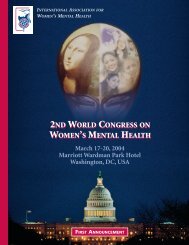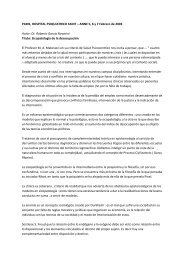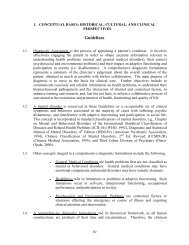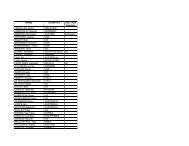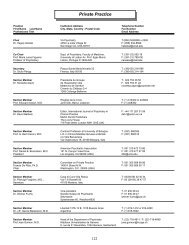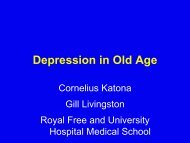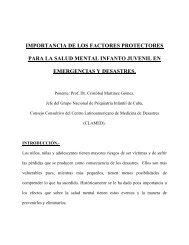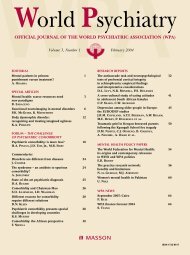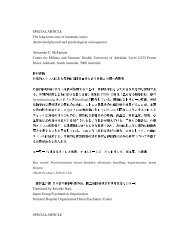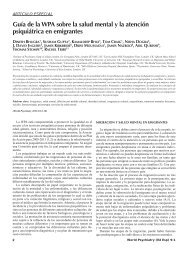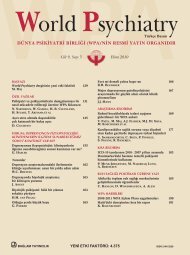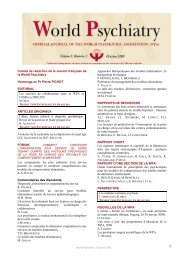ABSTRACTS - World Psychiatric Association
ABSTRACTS - World Psychiatric Association
ABSTRACTS - World Psychiatric Association
Create successful ePaper yourself
Turn your PDF publications into a flip-book with our unique Google optimized e-Paper software.
RS19.<br />
CURRENT CLINICAL PERSPECTIVES<br />
IN PSYCHOSOMATIC MEDICINE<br />
RS19.1.<br />
CURRENT ISSUES ON COMORBID CONDITIONS<br />
P. Ruiz<br />
Department of Psychiatry and Behavioral Science, Houston,<br />
TX, USA<br />
Comorbidity conditions have become a major clinical area of interest<br />
in recent years. While we have become very much aware of all the<br />
current diagnostic categories included in the DSM-IV, the presence of<br />
more than one psychiatric illness or condition in day to day psychiatric<br />
practice is the rule rather than the exception. Comorbidity factors<br />
nowadays need to be taken into consideration not only among<br />
psychiatric and medical conditions, but also among psychiatric conditions<br />
as well; for instance, it is common to see major depression or<br />
anxiety disorders manifested together with addictive disorders such<br />
as cocaine dependence. Depressive disorders are among the most<br />
common conditions observed in the field of psychiatry, and, therefore,<br />
it is imperative that we pay attention to the psychiatric conditions<br />
that are concomitantly manifested with depressive disorders in<br />
our daily practice. This paper aims to review the extensive role of<br />
comorbidities related to depression as a major financial burden in the<br />
field of psychiatry, and the evidence about how to appropriately diagnose<br />
and treat these comorbidities.<br />
RS19.2.<br />
CURRENT TREATMENT OF POSTPARTUM<br />
DEPRESSION<br />
N.L. Stotland<br />
Rush Medical College, Chicago, IL, USA<br />
Postpartum depression is finally receiving appropriate public and<br />
professional interest. A book by an American movie star, and her<br />
public statements, have helped to decrease stigma. Psychotherapies<br />
are as effective for postpartum depression as for depression at other<br />
times in life, and can be first-line treatment for mild to moderate cases<br />
of postpartum depression. Patients who are more severely depressed<br />
will probably require pharmacologic treatment. There is some concern<br />
about the possible dangers of some or all psychotropic medications,<br />
particularly the selective serotonin uptake inhibitors (SSRIs)<br />
most commonly used to treat depression, to the breastfeeding infant.<br />
There is an increasing body of knowledge about the appearance of the<br />
various SSRIs in breast milk. However, it may be unwise to change<br />
medication in cases where several agents had to be tried before therapeutic<br />
benefit was achieved. If a woman has taken an SSRI during<br />
pregnancy, and up to the time of delivery, the small amount in breast<br />
milk may even diminish the risk of withdrawal symptoms in the baby.<br />
It is crucial to understand and to explain to the patient the documented<br />
and persistent ill effects that having a mother who is<br />
depressed has on a baby, so that the best possible risk/benefit ratio<br />
can be determined. It is often useful to involve those closest to the<br />
patient in the treatment decision. Since postpartum depression<br />
undermines a new mother’s confidence in her mothering ability, it is<br />
also crucial to encourage and support her in that function.<br />
RS19.3.<br />
CURRENT EDUCATIONAL ISSUES PERTAINING<br />
TO CERTIFICATION IN PSYCHOSOMATIC MEDICINE<br />
D.K. Winstead<br />
Department of Psychiatry and Neurology, Tulane University<br />
School of Medicine, New Orleans, LA, USA<br />
Psychosomatic medicine (formerly known as consultation-liaison psychiatry)<br />
has advanced rapidly in the United States in the past two<br />
decades. Similar advances are also taking place in other industrialized<br />
nations such as Canada, Japan, European countries and others. In<br />
2003, the American Board of Psychiatry and Neurology officially recognized<br />
this field and set about to create a written examination for certification<br />
purposes and a second examination to be taken 10 years later<br />
for maintenance of certification (recertification). At the same time, the<br />
Accreditation Council of Graduate Medical Education approved a one<br />
year fellowship and set forth requirements for official accreditation. To<br />
date approximately 36 programs have been accredited and 853 individuals<br />
have been certified. Criteria for program accreditation are<br />
reviewed, as well as the major topics covered in the content outline of<br />
material that is ultimately tested by the written Board examination. The<br />
examination is administered by computer at a specialized testing center.<br />
Two hundred questions are administered over a 4 hour period.<br />
Although viewed as a subspecialty that would train psychiatrists for an<br />
academic or tertiary care practice, the numbers are not yet robust<br />
enough to sustain the field. Possible remedies for this dilemma would<br />
involve both increased funding for fellowship training as well as<br />
increased reimbursement for patient care services delivered.<br />
RS19.4.<br />
ILLNESS, SPIRITUAL BELIEFS AND CULTURE<br />
IN PSYCHIATRIC CONSULTATIONS<br />
E.F. Foulks<br />
Jefferson Parish Human Services Authority, Metaire, LA, USA<br />
Gallup opinion surveys in the US have found that the number of people<br />
who indicate that they believe in God has remained consistently<br />
around 95%. About a third of these view religious commitment as “the<br />
most” significant component of their lives. Two thirds say religion is<br />
“important or very important” in their lives and indicate a preference<br />
for “a professional counselor who is religious”. Scott Peck has pointed<br />
out that, while patients often invoke religious beliefs to explain their<br />
symptoms of mental disorder, they are seldom elicited by or communicated<br />
to the mental health professional, often resulting in misdiagnosis<br />
and mistreatment. Treating the “whole person”, body and soul, has<br />
been the aim of physicians since antiquity. During the past century,<br />
advances in biomedical science and technology have often shifted<br />
focus of the clinician on biological tests and treatments, sometimes<br />
neglecting the inner-psychological experiences of suffering of the<br />
patient. Returning the clinical gaze once again on the bio-psychosocial-spiritual<br />
needs of the patient seems to be an inevitable emerging<br />
process, one that promises to enrich the experience of healing for the<br />
patient and clinician as well, offering both hope and meaning.<br />
49



